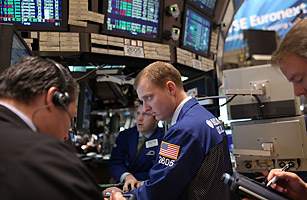
These days, watching the floor of the New York Stock Exchange from one of the balconies hovering above the room is about as exciting as having box seats for the local library check-out line. There are no swelling pits of traders screaming orders and exchanging pieces of paper; rather, there are people with tablets making trades electronically, many coordinating with computerized programs that shift millions of shares in a fraction of a second. The world of trading has been going increasingly digital for decades, and while it may make the trades go faster — getting rid of those fat ole fingers and their fat ole commissions — some also worry that it puts the market more at risk. Many pointed to overzealous algorithms last May when there was a wild 1,000-point market swing in a single afternoon. But while computers may not possess the virtues of thoughtfulness and temperance, machines that do so much to increase the volume of trades while reducing prices aren't going to lose this battle. One just hopes Michael Douglas doesn't get replaced by a relative of HAL in Wall Street 3: Computers Don't Sleep Either.